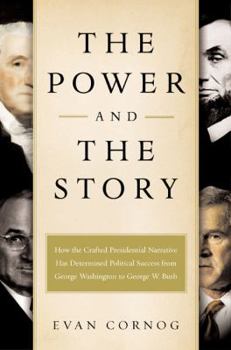The Power and the Story: How the Crafted Presidential Narrative Has Determined Political Success from George Washington to George W. Bush
A masterly new look at the American presidency, revealing the importance of the way presidents craft personal narratives-persuasive storytelling that has a crucial effect on the electorate and the... This description may be from another edition of this product.
Format:Hardcover
Language:English
ISBN:159420022X
ISBN13:9781594200229
Release Date:June 2004
Publisher:Penguin Press
Length:307 Pages
Weight:1.20 lbs.
Dimensions:1.1" x 6.4" x 9.2"
Customer Reviews
2 ratings
Stuff You Knew, Stuff You Suspected
Published by Thriftbooks.com User , 20 years ago
This is a view of presidential "spin" throughout American history. Our Presidential war heroes aren't limited to the few that we ordinarily think of (Grant, T. Roosevelt, Eisenhower and Kennedy); it was also Washington's success in the Revolution that led him to the Presidency. Andrew Jackson beat the British in 1815 during the Battle of New Orleans. Who cares if the war was already over, or if Roosevelt picked a fight with Cuba specifically to look good? They're still heroes! Cornog notes that the truth is not always relevant to the story. For instance, the Washington-and-the-cherry-tree story is apocryphal. Likewise GW Bush's inflating of Saddam Hussein's pursuit of the weapons of mass destruction. He points out that there's a cycle to the story, that it's sent to the press, which itself behaves as an actor and chorus in interpreting and relaying it to the public, and then as an audience as well, by reacting and allowing the story to return to its source for reinterpretation and re-dissemination. In some cases, the story becomes part of the president's "next life." Former presidents or even non-presidential statesmen, in publishing their memoirs, have tried to change the focus or the blame on some of the more negative stories about them by attempting to put them in a different context. In some cases the attempt was successful (George Washington and the tree didn't even come out until after he had died, but it's so central to the myth that it was accepted), others not so much (Nixon convincing himself that the decision to invade Cambodia was right by repeatedly watching "Patton", as noted in H. R. Haldeman's memoir). It's even more clear in the light of the 2004 Presidential campaign that the election will likely be decided by the power of the stories told about the candidates, and how they react (or fail to react) to those stories. There have already been several examples of this: Jimmy Carter's "outsider" story played well the first time, but couldn't be used in 1980 and his 1979 "malaise" speech, combined with Reagan's "There you go again" in the debate doomed him to lose to Reagan. Again, it didn't even matter that Carter's statement that generated Reagan's response was actually correct. "There you go again" became the story. In 1984, Walter Mondale tried using the truth when he said that [Reagan] will raise taxes, and so will I. He won't tell you. I just did." Well the truth hurts, and it damaged Mondale in the polls. And again, Reagan had a line that effectively ended the debate when he said, "I will not make age an issue of this campaign. I am not going to exploit for political purposes my opponent's youth and inexperience." For those of you who saw the debate, the look on Mondale's face said basically, "yeah, this one's over." My only complaint with Cornog's work is that it's rather brief; I would have like to see a little more backstory on several of the incidents cited in the book. But perhaps this book can be used as a springb
Intelligent history and great campaign guide
Published by Thriftbooks.com User , 20 years ago
This is a very smart book. The Power and the Story pulls together presidential history from George Washington to George W. Bush, media theory, and Cornog's own wisdom to analyze the importance of storytelling in presidential politics. We may know on some level that our presidential candidates are crafting life stories for themselves to advance or facilitate their political futures-both in reality, like John Kerry choosing to go to Vietnam, or in myth, like Kerry's campaign film created by a protege of Steven Spielberg-but Cornog shows how that tradition began, how these stories are manufactured, and why they work-or don't. Cornog gives us a powerful filter through which to interpret and evaluate modern political campaigning; this is the best single theory for understanding presidential politics I've ever read. An added pleasure is that the book is written lucidly and contains a breadth of historical knowledge that is quite remarkable. Combining literature, myth, history and current events, Cornog uses references from Herodotus to Jane Austen to September the 11th, all in an inconspicuous but highly useful way. Before an election this important, everyone should read The Power and the Story.






